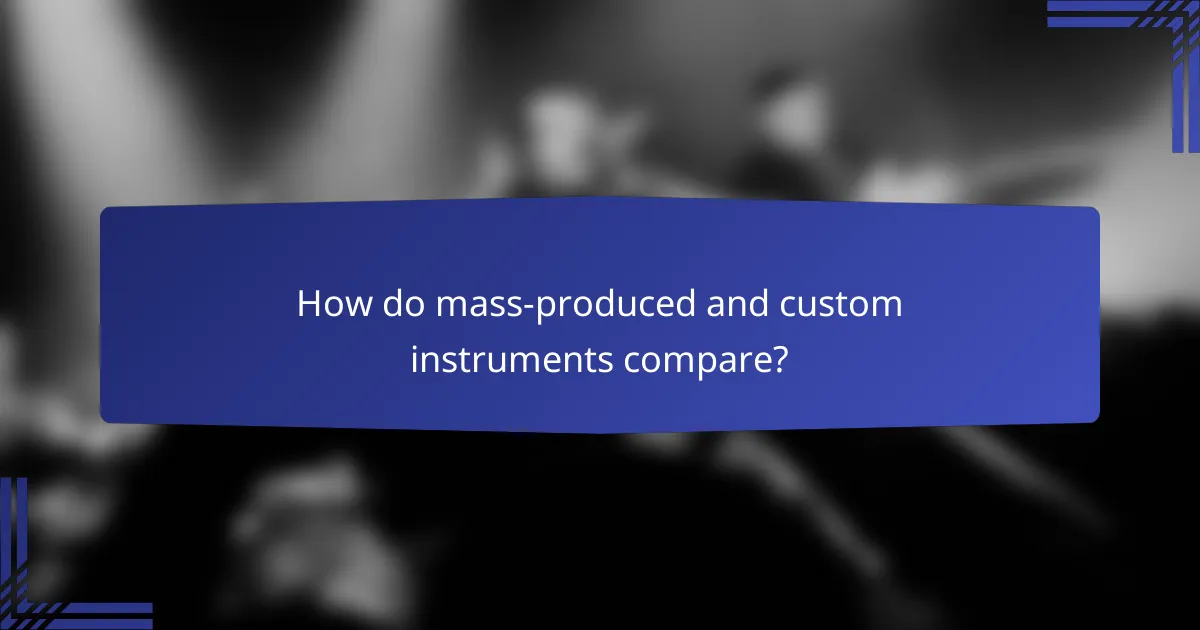When choosing between mass-produced and custom instruments, it’s essential to consider your specific needs and preferences. Mass-produced instruments are often more affordable and readily available, making them suitable for beginners and those on a budget. In contrast, custom instruments provide tailored features and unique craftsmanship, catering to musicians seeking a personalized touch in their sound and performance.

What are the advantages of mass-produced instruments?
Mass-produced instruments offer several advantages, including affordability, consistent quality, and widespread availability. These benefits make them a popular choice for beginners and professionals alike.
Cost-effectiveness
Mass-produced instruments are typically more affordable than custom options due to economies of scale. Manufacturers can produce large quantities, which reduces the cost per unit. This makes them accessible for musicians on a budget or those just starting out.
For example, a mass-produced guitar might cost a few hundred dollars, while a custom-made version could easily exceed a thousand. This price difference can significantly impact purchasing decisions.
Consistency in quality
One of the key advantages of mass-produced instruments is their consistent quality. Manufacturers often adhere to strict quality control processes, ensuring that each instrument meets established standards. This reliability is crucial for musicians who need dependable performance.
Instruments produced in large batches often have uniform sound and playability, which can be a significant benefit for those who play in ensembles or bands where consistency is essential.
Availability in major markets
Mass-produced instruments are widely available in major markets, making them easy to find in music stores and online. This accessibility allows musicians to try out different models before making a purchase, ensuring they choose an instrument that suits their needs.
Additionally, the widespread distribution means that replacement parts and accessories are often readily available, further enhancing the practicality of mass-produced options.
Wide range of options
Mass production allows for a diverse range of instruments to be available, catering to various musical styles and preferences. Musicians can choose from different brands, models, and features without the long wait times associated with custom orders.
This variety enables players to experiment with different sounds and styles, from electric guitars to brass instruments, all within a similar price range.
Standardized features
Mass-produced instruments often come with standardized features that enhance usability and performance. These features are designed based on industry standards and musician feedback, ensuring that they meet the needs of a wide audience.
For instance, a mass-produced keyboard may include universally recognized key layouts and touch sensitivity, making it easier for musicians to transition between different instruments without a steep learning curve.

When should you choose custom instruments?
Custom instruments are ideal when you need specific features or designs that mass-produced options cannot provide. They cater to unique requirements, enhancing both functionality and personal expression in your music or work.
Unique specifications
Choosing custom instruments allows you to specify exact dimensions, materials, and features tailored to your needs. For instance, a guitarist may require a specific neck width or fretboard material that enhances playability. This level of customization ensures that the instrument fits your style and preferences perfectly.
When considering unique specifications, think about your playing style and the genres you focus on. Custom options can include variations in pickup types for electric guitars or the choice of wood for acoustic instruments, which can significantly affect sound quality.
Personalized design
Custom instruments offer the opportunity for personalized design that reflects your individual taste. You can choose colors, finishes, and inlays that resonate with your artistic identity. This personalization can make the instrument not only a tool but also a piece of art.
When designing your instrument, consider collaborating with a luthier or manufacturer who understands your vision. Providing sketches or examples of designs you admire can help ensure the final product aligns with your expectations.
Enhanced performance for specific needs
Custom instruments can enhance performance by addressing specific technical requirements. For example, a drummer might need a particular drumhead thickness to achieve a desired sound, while a violinist may require a unique string gauge for optimal playability.
Evaluate your performance needs carefully. If you frequently play in diverse environments or styles, a custom instrument can be engineered to adapt to those conditions, providing you with a significant advantage over standard models.
Artisan craftsmanship
Opting for a custom instrument often means benefiting from artisan craftsmanship, which emphasizes quality and attention to detail. Skilled artisans take the time to ensure that every aspect of the instrument is meticulously crafted, resulting in superior sound and durability.
When selecting an artisan, research their background and previous work. Look for testimonials or reviews from other musicians to gauge the quality of their craftsmanship and ensure you are investing in a reliable instrument.
Limited edition appeal
Custom instruments often come with a limited edition appeal, making them unique collectibles. Owning a one-of-a-kind instrument can enhance your status as a musician and provide a sense of pride in your equipment.
Consider the potential resale value of a limited edition instrument. While they may come at a higher initial cost, their rarity can make them more desirable in the long run, appealing to collectors and enthusiasts alike.

How do mass-produced and custom instruments compare?
Mass-produced instruments are typically more affordable and widely available, while custom instruments offer personalized features and craftsmanship. The choice between them depends on budget, intended use, and personal preference.
Price differences
Mass-produced instruments usually range from low to mid-tier prices, often starting at a few hundred dollars. In contrast, custom instruments can cost significantly more, often starting in the low thousands and going up based on specifications and materials.
When considering price, it’s essential to factor in not just the initial cost but also potential long-term value. Custom instruments may provide better durability and satisfaction, which can justify the higher investment.
Quality variations
Quality in mass-produced instruments can vary widely, with many brands adhering to strict manufacturing standards. However, they may lack the fine details and craftsmanship found in custom instruments, which are often made by skilled artisans.
Custom instruments typically offer superior materials and construction techniques, leading to enhanced sound quality and playability. Musicians seeking specific tonal characteristics or unique designs often prefer custom options for these reasons.
Customization options
Mass-produced instruments offer limited customization, primarily in color or minor features. This can be sufficient for beginners or casual players who prioritize affordability and availability.
Custom instruments, however, allow for extensive personalization, including choice of materials, finishes, and even specific design elements. This level of customization caters to professional musicians who require instruments tailored to their unique playing style.
Market demand trends
Currently, there is a growing demand for both mass-produced and custom instruments, driven by different segments of the market. Mass-produced instruments appeal to beginners and budget-conscious musicians, while custom instruments attract professionals and enthusiasts seeking quality and individuality.
Trends indicate that as more musicians seek personalized experiences, the custom instrument market is expanding, with many brands offering bespoke options to meet this demand.
Resale value considerations
Mass-produced instruments generally depreciate quickly, often losing a significant portion of their value shortly after purchase. This can make them less appealing as long-term investments.
Custom instruments, on the other hand, often retain their value better, especially if they are from reputable makers. Limited editions or highly sought-after models can even appreciate over time, making them a more strategic purchase for serious musicians.

What factors influence the choice between mass-produced and custom instruments?
The choice between mass-produced and custom instruments is influenced by several key factors, including budget, intended use, and the skill level of the player. Understanding these aspects can help musicians make informed decisions that align with their needs and preferences.
Budget constraints
Budget is often the most significant factor when choosing between mass-produced and custom instruments. Mass-produced instruments typically range from affordable to mid-range prices, making them accessible for beginners or those with limited funds. Custom instruments, on the other hand, can be considerably more expensive, often starting in the higher price brackets and going up significantly based on materials and craftsmanship.
When considering your budget, it’s essential to weigh the long-term investment of a custom instrument against the immediate affordability of a mass-produced option. If you are serious about your music and plan to play regularly, investing in a custom instrument may provide better value over time.
Intended use
The intended use of the instrument plays a crucial role in determining which option is best. For casual players or those just starting, mass-produced instruments are often sufficient for practice and learning. They provide a reliable and consistent experience without the need for a significant financial commitment.
Conversely, if you are a professional musician or require an instrument for specific performances or recordings, a custom instrument may be necessary. Custom options can be tailored to your playing style, sound preferences, and ergonomic needs, enhancing your overall performance.
Skill level of the player
The skill level of the player is another important consideration when choosing between mass-produced and custom instruments. Beginners may benefit from the affordability and availability of mass-produced instruments, which allow for experimentation without a large investment. These instruments are designed to be user-friendly and durable, catering to those still developing their skills.
Advanced players, however, often seek custom instruments that reflect their unique style and technical requirements. A custom instrument can offer superior playability, sound quality, and personalization, making it a worthwhile investment for serious musicians looking to elevate their craft.
